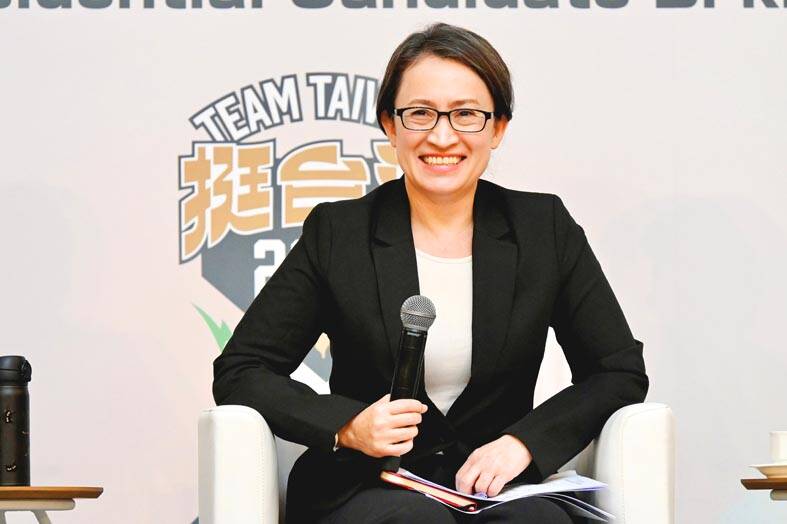Taiwan should “trust, but verify” reports that Chinese President Xi Jinping (習近平) denied that Beijing plans to invade Taiwan in 2027, Democratic Progressive Party (DPP) vice presidential candidate Hsiao Bi-khim (蕭美琴) told reporters yesterday.
“We anticipate and we hope that Chairman Xi Jinping was sincere when he said there was no timetable” for bringing Taiwan under control by force, said Hsiao, who earlier this week resigned as the representative to the US to join the ticket of DPP nominee, Vice President William Lai (賴清德).
Borrowing a phrase from former US president Ronald Reagan — which US President Joe Biden also used after his bilateral meeting with Xi in San Francisco on Wednesday last week — Hsiao said that Taiwan should “trust, but verify.”

Photo: George Tsorng, Taipei Times
A senior US administration official cited Xi as denying reports that China planned to take military action against Taiwan in 2027 or 2035 during last week’s bilateral meeting.
However, Xi also laid out the conditions under which force could be used, the official said, without specifying what those conditions were.
While the future Lai administration would welcome every opportunity to work with Beijing to maintain the “status quo,” Taiwan needs to continue building up its capability so as to deal with cross-strait relations with more confidence, Hsiao said.
Hsiao alluded to a “four-pillar plan” for peace proposed by Lai, with Taiwan boosting its defense capability and economic security, while seeking international partnerships and “principled and pragmatic” cross-strait relations.
The plan was modeled on the policy of outgoing President Tsai Ing-wen (蔡英文), with whom Beijing has refused to establish official contact, despite repeated requests during her eight years in office.
However, with Beijing labeling Lai and Hsiao as “separatists,” Hsiao was asked how the DPP ticket aims to resume government-to-government talks if elected in January.
Hsiao reiterated that they “remain open to dialogue” and would be “committed to the status quo.”
“It’s also important that [those in] the international community who agree with our position in continuing peace and stability in the Taiwan Strait make clear to our counterpart across the Taiwan Strait that dialogue is the only way to resolve differences,” Hsiao said.
“War is not an option,” she added.
When it comes to the US, Taiwan has to forge unified and bipartisan support, Hsiao said, adding that expanding broad support among Americans was critical.
“American support to Taiwan cannot be limited to the beltway,” Hsiao said, referring to the Washington political scene. “A rock solid partnership with the United States is critically important right now.”
Speaking of her decision to join Lai’s ticket, Hsiao, who had served four non-consecutive terms as a legislator prior to being posted to Washington in 2020, acknowledged having “tremendous hesitation” about returning to Taiwan and getting involved again in domestic politics.
While such a decision was “not an easy one,” Hsiao said that her alliance with Lai was forged based on their shared commitment to preserve Taiwan’s freedom and democracy.
Additional reporting by Reuters

AGING: As of last month, people aged 65 or older accounted for 20.06 percent of the total population and the number of couples who got married fell by 18,685 from 2024 Taiwan has surpassed South Korea as the country least willing to have children, with an annual crude birthrate of 4.62 per 1,000 people, Ministry of the Interior data showed yesterday. The nation was previously ranked the second-lowest country in terms of total fertility rate, or the average number of children a woman has in her lifetime. However, South Korea’s fertility rate began to recover from 2023, with total fertility rate rising from 0.72 and estimated to reach 0.82 to 0.85 by last year, and the crude birthrate projected at 6.7 per 1,000 people. Japan’s crude birthrate was projected to fall below six,

Conflict with Taiwan could leave China with “massive economic disruption, catastrophic military losses, significant social unrest, and devastating sanctions,” a US think tank said in a report released on Monday. The German Marshall Fund released a report titled If China Attacks Taiwan: The Consequences for China of “Minor Conflict” and “Major War” Scenarios. The report details the “massive” economic, military, social and international costs to China in the event of a minor conflict or major war with Taiwan, estimating that the Chinese People’s Liberation Army (PLA) could sustain losses of more than half of its active-duty ground forces, including 100,000 troops. Understanding Chinese

US President Donald Trump in an interview with the New York Times published on Thursday said that “it’s up to” Chinese President Xi Jinping (習近平) what China does on Taiwan, but that he would be “very unhappy” with a change in the “status quo.” “He [Xi] considers it to be a part of China, and that’s up to him what he’s going to be doing, but I’ve expressed to him that I would be very unhappy if he did that, and I don’t think he’ll do that. I hope he doesn’t do that,” Trump said. Trump made the comments in the context

SELF-DEFENSE: Tokyo has accelerated its spending goal and its defense minister said the nation needs to discuss whether it should develop nuclear-powered submarines China is ramping up objections to what it sees as Japan’s desire to acquire nuclear weapons, despite Tokyo’s longstanding renunciation of such arms, deepening another fissure in the two neighbors’ increasingly tense ties. In what appears to be a concerted effort, China’s foreign and defense ministries issued statements on Thursday condemning alleged remilitarism efforts by Tokyo. The remarks came as two of the country’s top think tanks jointly issued a 29-page report framing actions by “right-wing forces” in Japan as posing a “serious threat” to world peace. While that report did not define “right-wing forces,” the Chinese Ministry of Foreign Affairs was